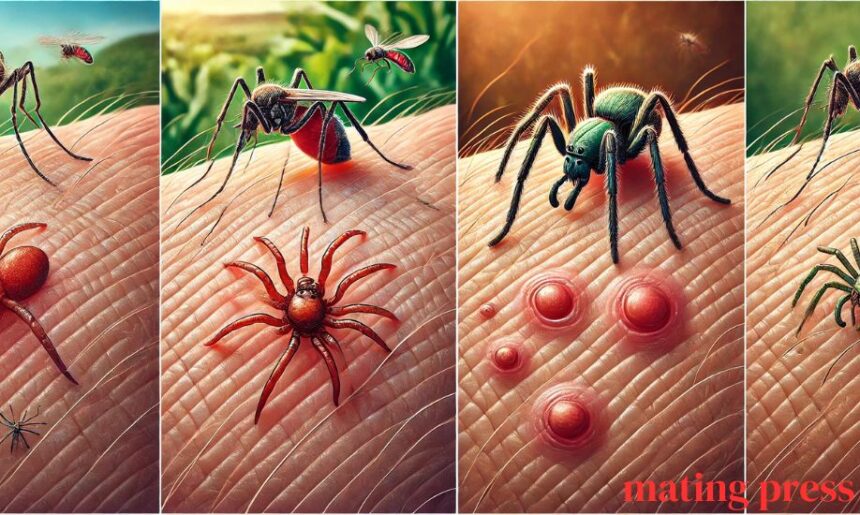When it comes to insect bites, people often wonder about the differences between a spider bite versus mosquito bite. Both can cause discomfort, but they differ in symptoms, severity, and treatment. Understanding the distinctions between these bites can help individuals treat them more effectively and prevent potential complications. In this article, we will dive into the specifics of spider bite versus mosquito bite, highlighting their characteristics and offering insight on how to manage them.
As a frequent topic discussed on the Mating Press blog, it’s essential to break down these common insect bites to provide a clear understanding of how to handle them, which could make all the difference in maintaining comfort and health. Let’s explore this subject in more depth, starting with the key differences between spider bites and mosquito bites.
Understanding the Difference: Spider Bite Versus Mosquito Bite
At first glance, spider bite versus mosquito bite may appear similar, but they stem from very different creatures and cause varied reactions. Mosquitoes are well-known for their itchy bites and potential to spread diseases, while spiders are often feared for their venomous fangs.
Mosquito Bite: The Basics
Mosquito bites are very common, especially during warmer months when these insects thrive. Mosquitoes feed on blood, using their long mouthparts to pierce the skin and draw out blood. The mosquito injects saliva into the bite site, which contains proteins that prevent blood clotting. The body reacts to these proteins by releasing histamines, leading to the characteristic itchy, red bump.
For most people, mosquito bites result in mild itching and discomfort. However, in some cases, mosquito bites can transmit diseases such as malaria, Zika virus, or West Nile virus. These serious conditions make mosquito bites more than just a minor annoyance.
Spider Bite: What You Should Know
Spider bites, in contrast, are far less common than mosquito bites, and many species of spiders are harmless to humans. Most spider bites occur when a spider feels threatened or is accidentally trapped against the skin. The bite typically comes from the spider’s fangs, which can inject venom into the skin. The severity of a spider bite depends on the species of spider, with some bites being as harmless as a mosquito bite and others posing a more serious threat.
Venomous spiders, such as the Black Widow or Brown Recluse, can cause significant reactions. Symptoms of a venomous spider bite include muscle pain, cramping, and sometimes more severe complications like necrosis (tissue death).
Symptoms of Spider Bite Versus Mosquito Bite
One of the most crucial aspects of identifying spider bite versus mosquito bite is recognizing their symptoms.
Symptoms of a Mosquito Bite
- Immediate Reaction: Mosquito bites result in an immediate red, swollen bump. Itching typically follows within minutes or hours.
- Localized Swelling: In some cases, mosquito bites can cause significant localized swelling, especially in individuals who are allergic.
- Possible Complications: As mentioned earlier, mosquito bites can transmit diseases, though this is rare depending on geographic location.
Symptoms of a Spider Bite
- Puncture Marks: A spider bite may leave small puncture marks from the spider’s fangs, which are usually visible.
- Delayed Reaction: While some spider bites cause immediate pain, others may take hours or even days for symptoms to develop.
- Venomous Bite Symptoms: Bites from venomous spiders, like the Black Widow, can cause muscle cramps, fever, and more serious symptoms. Brown Recluse bites may develop into a necrotic wound over time.
How to Treat Spider Bite Versus Mosquito Bite
Once you have identified whether you are dealing with a spider bite versus mosquito bite, the treatment approach will vary slightly.
Treating a Mosquito Bite
Mosquito bites are relatively easy to treat with home remedies or over-the-counter medications:
- Antihistamines: Oral antihistamines can reduce itching and swelling.
- Topical Creams: Hydrocortisone cream or calamine lotion helps soothe itching.
- Cold Compress: Applying a cold compress to the bite can also help reduce swelling and relieve discomfort.
For individuals who have allergic reactions or are concerned about the possibility of disease transmission, it is important to seek medical attention immediately.
Treating a Spider Bite
Spider bite treatment depends on the severity of the bite. For non-venomous bites, basic first aid will usually suffice:
- Clean the Bite: Gently wash the bite with soap and water to prevent infection.
- Pain Relief: Over-the-counter pain relievers like ibuprofen can help alleviate discomfort.
- Ice Pack: Applying an ice pack can help reduce swelling and pain.
If you suspect a bite from a venomous spider, it is crucial to seek medical attention promptly. Symptoms like severe pain, cramping, fever, or the development of an ulcer at the bite site are signs of a venomous bite that needs professional care.
Preventing Spider Bite Versus Mosquito Bite
Prevention is always better than treatment, and protecting yourself from both mosquito and spider bites can save you from unnecessary discomfort and complications.
Preventing Mosquito Bites
To prevent mosquito bites, especially during high-risk seasons:
- Use Insect Repellent: Repellents containing DEET or natural oils like citronella can keep mosquitoes away.
- Avoid Peak Hours: Mosquitoes are most active during dawn and dusk, so avoid outdoor activities during these times if possible.
- Wear Protective Clothing: Long sleeves and pants can help prevent bites, especially in areas with high mosquito populations.
Preventing Spider Bites
To avoid spider bites, follow these simple guidelines:
- Keep Your Home Clean: Spiders tend to hide in cluttered areas, so regular cleaning can reduce their presence.
- Wear Gloves: When working in the garden or areas where spiders might reside, wear gloves to avoid accidental bites.
- Seal Entry Points: Make sure doors and windows are well-sealed to keep spiders out of your home.
Conclusion: Spider Bite Versus Mosquito Bite – Understanding the Differences
In conclusion, both spider bites and mosquito bites can cause discomfort, but their impacts and treatments differ significantly. While mosquito bites are more common and often associated with mild itching, spider bites can range from mild to severe, depending on the species involved. Understanding these differences, and knowing when to seek medical attention, is crucial for staying safe.
As we regularly discuss on Mating Press, protecting yourself from these types of bites can improve your overall well-being. Whether it’s preventing a mosquito bite during a summer hike or avoiding a spider bite while gardening, taking the necessary precautions is always a smart move. With proper knowledge and preventive measures, you can enjoy your activities without the worry of insect bites.
The Mating Press blog aims to provide insightful information to keep you informed and safe.





